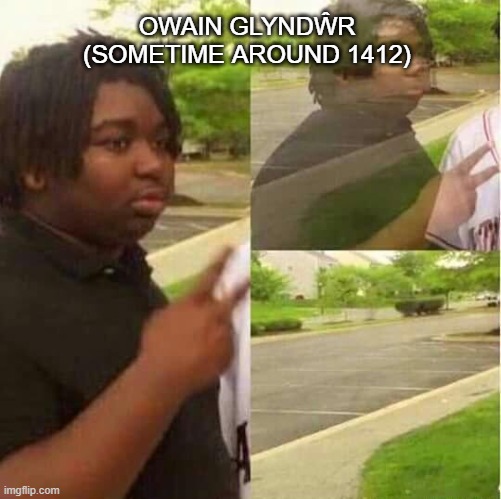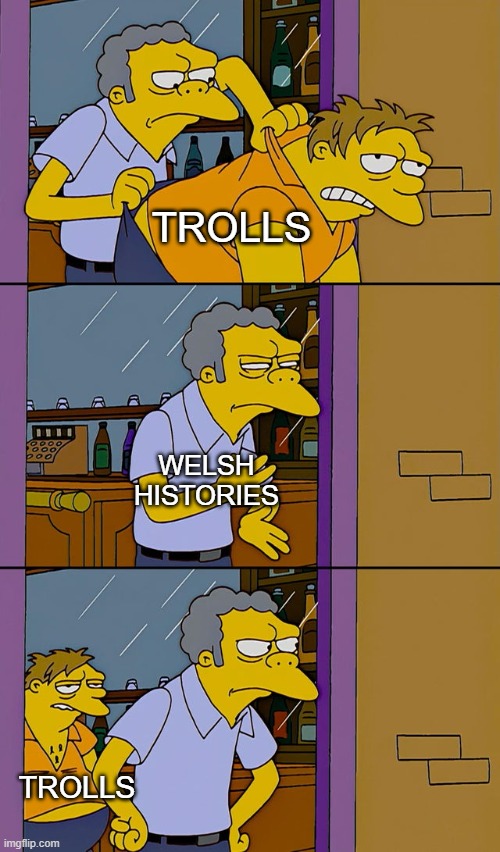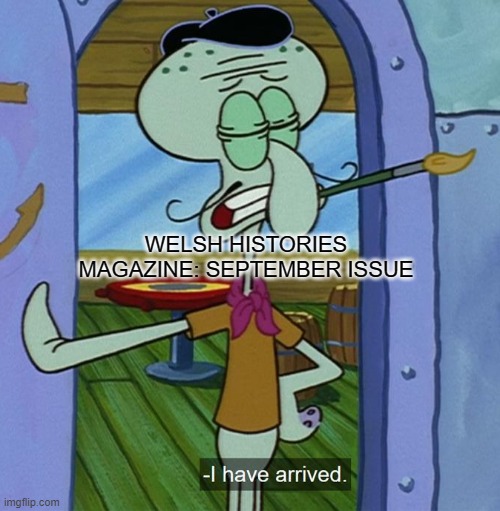Your basket is currently empty!
Welsh History Memes That Will Change How You View the Past
If Welsh History Memes That Will Have You Asking, ‘Where Have These Been All My Life? didn’t fully satisfy your meme cravings, don’t fret—there’s even more Welsh humor coming your way!
Disclaimer: All memes are crafted by the Welsh Histories Facebook Page. By crediting us, you help support our efforts to create and share more fascinating content on Welsh history.
#1.

To English royalist historians, Edward I is often remembered as one of the most successful Kings of England.
To the Welsh and Scots, however, his place in history is forever cemented as being the primary historical enemy.
A cruel and vicious King who attempted to eradicate us.
#2.

The typically accepted claim that William the Conqueror had no intention of conquering the Welsh Kingdoms isn’t quite as true as it appears.
Even on his way to St David’s in 1081 (when he is said to have declared his disinterest in conquering the Welsh), he is believed to have founded Cardiff in Welsh lands.
The Lords he appointed at Hereford, Shrewsbury and Chester did not share his claimed lack of appetite for Welsh lands, either.
Even if we let William off, his son, Henry I, was a ravaging nuisance in the southern parts of Cymru – claiming hundreds of miles of Welsh lands and establishing the first royal castle at Carmarthen in 1109.
Was William lying to appease his neighbours or was he biding his time?
#3.

I still love that Owain Glyndŵr successfully disappeared; was never captured and that he never accepted the multiple royal pardon attempts by Henry V. A rebel until the very end (which is believed to be in 1415).
#4.

Typically, when someone finds out I am Welsh, I am immediately tasked with pronouncing “Llanfairpwllgwyngyllgogerychwyrndrobwllllantysiliogogogoch.”
It comes with the territory, I guess.
#5.

I never go a single day without thinking about Welsh history (and, to be fair, it’s not possible when running Welsh Histories anyway).
It is a subject which has so much depth; so many high and low moments and, ultimately, it adds to one’s own Welshness when they think about it.
What’s your favourite aspect of Welsh history and how can I better incorporate it into posts? Feel free to let me know!
#6.

I am very lenient when it comes to bans but please do let me know if you encounter someone in the comments section who is trolling. My comments policing team (literally just me) reviews every case and takes action if necessary.
Also, this doesn’t mean that you can report *anyone* just for disagreeing with you. I do like healthy debate, though on some topics more than others. There’s a time and place, folks.
#7.

Some say that the biggest enemy of the Welsh throughout the medieval era was neither the Anglo-Saxons, nor the Normans, but our fellow Welsh.
While I would respectfully disagree, perhaps this is evidenced somewhat in the case of Gruffydd ap Llywelyn (1010-1063) – the only Welsh King who united all of Cymru under one rule between 1053 and 1063.
During this time, there was no internal strife and he was the undeniable “Head of the Britons” (Brut y Tywysogion, 13th century). Yet, Gruffydd would face a premature death because of the actions of some his fellow Welsh, who worked with the last crowned Anglo-Saxon English King, Harold Godwinson, in bringing his downfall.
A unified Cymru would have been far better prepared to face the might of the looming Norman invasion and, perhaps, the murder of Gruffydd ap Llywelyn was the beginning of the end.
#8.

This is pretty much true for all 19th century examples of Welsh settlers around the world.
Bala, Ontario. Llangothlin, New South Wales. Llandudno, South Africa.
Yep, it checks out ![]()
#9.

When a Welsh person meets a Breton person for the first time ![]()
For those unaware, Welsh and Breton history has entwined many times.
Our native languages (Cymraeg and Brezhoneg) share origins, along with our friends in Kernow, in the Brythonic language and have both been historically oppressed. We are also two of the six “Celtic Nations”.
#10.

The last great victory for Owain Glyndŵr came in 1412, when he and his forces successfully captured and ransomed Dafydd Gam (Crooked David, an unfortunate if not telling nickname), a supporter of English King Henry IV.
After this, Glyndŵr disappeared with only rumours of sightings between 1412 and his perceived death in 1415.
The question is: how close did Glyndŵr come to achieving victory?
#11.

This is the last I’ll mention on the topic for a short while.
It just never ceases to amaze me that there are actually people who take issue with a Welsh history page raising awareness to history that they don’t approve of.
This goes two ways too, as I have been called both a “pumped up Welsh nationalist” (whatever that means) and “Anglicised” in the same week.
#12.

Raising awareness to Welsh history is *not* anti-English.
Anyone who thinks that Welsh people taking issue with/discussing the Edwardian Conquest, Penal Laws, Laws in Wales Act, Welsh Not, Capel Celyn, Aberfan etc and the clear Norman/English establishment connection to each of these events is somehow anti-English, then I don’t know what else I can tell you.
I won’t be silenced when talking about these historic events, either, because Welsh history is far more than daffodils and hats (though I have also quite recently made posts about these two things, too).
Literally no one is blaming the present-day English. Stop the nonsense. Oh, and to the vast majority of English people who join in with constructive, positive and endearing discussion: diolch yn fawr/thank you very much!
POV

Get your PHYSICAL or digital copy of Welsh Histories magazine today!
Share us your thoughts on [email protected]
Welsh Maps That Will Make You Feel Smart About Welsh History
Welsh Maps That Will Make You Feel Smart About Welsh History (Part 2)
Cymru’s Worst Ever Tornado Tragedy from Over a Century Ago that Many Have Forgotten Today
Bala, Kansas: A Welsh Ghost Town That Will Remind You of a Painful Past
Bestsellers
-
(UK ONLY) YEARLY Subscription Welsh Histories Magazine
£79.99 -
(US & CAN ONLY) YEARLY Subscription Welsh Histories Magazine
£129.99 -
DIGITAL COPY Welsh Histories Magazine – April 2024
Original price was: £2.99.£1.99Current price is: £1.99. -
DIGITAL COPY Welsh Histories Magazine – August 2024
£3.99 -
DIGITAL COPY Welsh Histories Magazine – December 2024
£6.99
More from Welsh Histories
Welsh Histories is a Welsh history celebrating platform which looks to promote all aspects of Welsh history. Though we focus predominantly on native Welsh history, we do also share the non-native aspects from time to time. You can follow us on Facebook; Instagram or Twitter for more. A reader? We also have our very own Welsh Histories Shop where we sell our Welsh Histories Magazine. Diolch yn fawr iawn and keep enjoying Welsh Histories
Sally is a proud wife of a Welshman, editor & writer of Welsh Histories. She’s all about stories—that shout ‘anything Welsh.’ Drop her an email if you have an advice, insight, experience, or a story to share.




